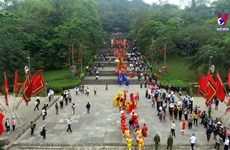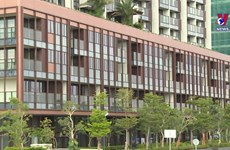Lai Chau settlers happy with their new life
Since moving to Nam Khao village in Nam Khao commune, Muong Te district, Lai Chau province in 2013, Chang Thi Lam often goes to medical station for health checkups and to get free medicine.
“The medical station is now near my house. Getting medicine is convenient. I don’t have to pay money,” Lam said.
Meanwhile, Seng Van Son, a medical station staff said: “Since the medical station was moved to the centre of the village, more residents go to the station for health checkups because it’s more convenient.”
With the aim of ensuring a better life for resettled people, Lai Chau province has paid heed to building infrastructure in resettlement areas.
Local households are helped to build new houses, cultivate rice and are given rice for four years. Thanks to that, their lives have improved, with the poverty rate sharply cut down, and all children at school age going to school.
“Before, there was only one class for pupils and no room for the school administration,” Vice Headmaster of Nam Khao Kindergarten Lo Van Dung said. He added after the resettlement project, the school has been provided with equipment for classes, functional rooms and working place for the school administration.
Coming into operation in late December 2016, Lai Chau hydropower plant is the third largest built on the Da River with total capital of about 1.62 billion USD. Of which, capital for the resettlement exceeds 245 million USD, focusing on two districts of Nam Nhun and Muong Te.
Tran Duc Hien, Vice Chairman of Muong Te district People’s Committee said: “In general, the resettlement project ensures a better life for locals. Muong Te district has one commune meeting all criteria of a new-style rural area and is vivid evidence of the programme’s success.”
In addition, to help preserve the cultural life of local ethnic groups, each village has a cultural house and a troupe so that they can exchange and preserve their cultural identities.
Chairman of the Nam Khao Commune People’s Committee Ly Van Hieu said currently, all six villages have their own troupe. Recently, a cultural festival of ethnic groups was held, drawing the participation of all troupes. Each troupe receives annual assistance from the State of six million dong, which is used for local cultural preservation, he noted.
With local authorities’ efforts in conjunction with people’s unanimity, the migration and resettlement work has reaped achievements. But there are still challenges facing the locality.
Lai Chau has been working to deal with reclamation, provide farming land for households, in a bid to help locals stabilise their lives on the new land.-VNA













